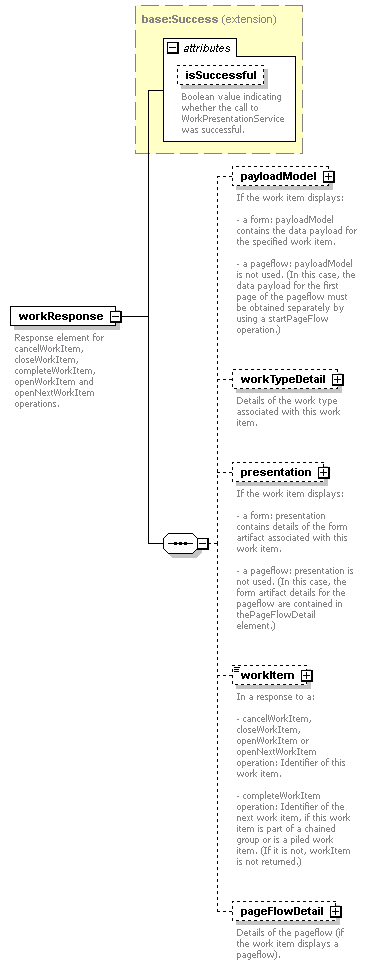| diagram |  |
||||||||||||||
| namespace | http://api.wp.n2.tibco.com | ||||||||||||||
| type | extension of Success | ||||||||||||||
| properties |
|
||||||||||||||
| children | payloadModel workTypeDetail presentation workItem pageFlowDetail | ||||||||||||||
| attributes |
|
||||||||||||||
| annotation |
|
||||||||||||||
| source | <xs:element name="workResponse"> <xs:annotation> <xs:documentation>Response element for cancelWorkItem, closeWorkItem, completeWorkItem, openWorkItem and openNextWorkItem operations.</xs:documentation> </xs:annotation> <xs:complexType> <xs:complexContent> <xs:extension base="base:Success"> <xs:sequence> <xs:element name="payloadModel" type="df:dataPayload" nillable="true" minOccurs="0"> <xs:annotation> <xs:documentation>If the work item displays: - a form: payloadModel contains the data payload for the specified work item. - a pageflow: payloadModel is not used. (In this case, the data payload for the first page of the pageflow must be obtained separately by using a startPageFlow operation.) </xs:documentation> </xs:annotation> </xs:element> <xs:element name="workTypeDetail" nillable="true" minOccurs="0"> <xs:annotation> <xs:documentation>Details of the work type associated with this work item. </xs:documentation> </xs:annotation> <xs:complexType> <xs:complexContent> <xs:extension base="base:WorkType"> <xs:sequence> <xs:element name="dataModel" type="dm:DataModel" minOccurs="0"> <xs:annotation> <xs:documentation>** PRIVATE API - Reserved for internal use **</xs:documentation> </xs:annotation> </xs:element> </xs:sequence> <xs:attribute name="typePiled" type="xs:boolean" use="required"> <xs:annotation> <xs:documentation>Boolean value specifying whether this work type is a piled work type.</xs:documentation> </xs:annotation> </xs:attribute> <xs:attribute name="pilingLimit" type="xs:int"> <xs:annotation> <xs:documentation>Maximum number of piled work items of this work type (pecified only or a piled work type).</xs:documentation> </xs:annotation> </xs:attribute> </xs:extension> </xs:complexContent> </xs:complexType> </xs:element> <xs:element name="presentation" nillable="true" minOccurs="0"> <xs:annotation> <xs:documentation>If the work item displays: - a form: presentation contains details of the form artifact associated with this work item. - a pageflow: presentation is not used. (In this case, the form artifact details for the pageflow are contained in thePageFlowDetail element.) </xs:documentation> </xs:annotation> <xs:complexType> <xs:attribute name="type" use="required"> <xs:annotation> <xs:documentation>Type of form artifact. One of: - GWT_FORM - GI_FORM - PAGEFLOW - CUSTOM_FORM - FORM </xs:documentation> </xs:annotation> <xs:simpleType> <xs:restriction base="xs:string"> <xs:enumeration value="GWT_FORM"/> <xs:enumeration value="GI_FORM"/> <xs:enumeration value="PAGEFLOW"/> <xs:enumeration value="CUSTOM_FORM"/> <xs:enumeration value="FORM"/> </xs:restriction> </xs:simpleType> </xs:attribute> <xs:attribute name="formIdenitifier" type="xs:string" use="optional"> <xs:annotation> <xs:documentation>Identifier for the JSON form artifact to be used to display the data for the work item. </xs:documentation> </xs:annotation> </xs:attribute> <xs:attribute name="activityName" type="xs:string" use="optional"> <xs:annotation> <xs:documentation>Name of the process activity from which the work item was generated. </xs:documentation> </xs:annotation> </xs:attribute> <xs:attribute name="version" type="xs:string"> <xs:annotation> <xs:documentation>Version number of the form artifact.</xs:documentation> </xs:annotation> </xs:attribute> </xs:complexType> </xs:element> <xs:element name="workItem" type="base:WorkItem" nillable="true" minOccurs="0"> <xs:annotation> <xs:documentation>In a response to a: - cancelWorkItem, closeWorkItem, openWorkItem or openNextWorkItem operation: Identifier of this work item. - completeWorkItem operation: Identifier of the next work item, if this work item is part of a chained group or is a piled work item. (If it is not, workItem is not returned.) </xs:documentation> </xs:annotation> </xs:element> <xs:element name="pageFlowDetail" type="wp:pageFlowType" minOccurs="0"> <xs:annotation> <xs:documentation>Details of the pageflow (if the work item displays a pageflow).</xs:documentation> </xs:annotation> </xs:element> </xs:sequence> </xs:extension> </xs:complexContent> </xs:complexType> </xs:element> |
WSDL documentation generated by XMLSpy WSDL Editor http://www.altova.com/xmlspy